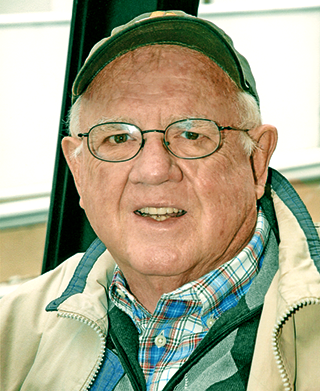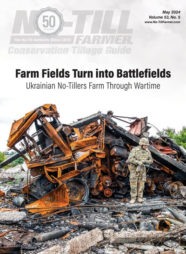John Baker maintains the consequences of plowing today are serious enough that tillage tools should come with warning labels that are similar to cigarettes.
And as Managing Editor John Dobberstein recently pointed out in our e-mail newsletter, No-Till Farmer E-Tip, our staff has always argued that tillage is addictive, especially when it’s recreational tillage that accomplishes little or nothing.
Dobberstein’s article dealt with New Zealand ag engineer John Baker pointing out the many consequences of doing conventional tillage. The developer of the Cross Slot no-tillage system noted that extensive tillage contributes to global warming, crop failures and erosion. In fact, Baker maintains a continued emphasis on intensive tillage will eventually lead to famine in some parts of the world.
“No-tillage is the equivalent of keyhole surgery as opposed to plowing, which is invasive surgery,” Baker says. He believes it’s important to recognize that no-tillage is the only method of seeding that can feed a hungry world.
Definitely a no-till advocate, Baker says plowing releases carbon into the atmosphere, which adds to global warming and depletes the number of important microorganisms that enrich the soil. Over time, he’s convinced that tillage leads to serious soil erosion, crop failure and drought problems.
Feeding the World
Baker says the single-greatest challenge facing the world today is feeding a population that will increase by 50% over the next 4 decades.
“Only 4% of the world’s surface has arable soil,” says Baker. “That’s not likely to increase, so we have to learn to farm it more sustainably which we simply haven’t been doing. We can get away with conventional methods in New Zealand because we have rich soil and rotating pastures, but other countries don’t have that luxury.”
Unlike plowing, he says no-till reduces soil disturbance, utilizes the moisture in humidity and preserves the microorganisms and soil life. In addition, no-till largely prevents carbon from escaping into the atmosphere and significantly improves crop yield.
We agree with Baker’s viewpoints, but it’s hard to say U.S. farmers have turned their backs on the plow. While over 90 million U.S crop acres are no-tilled, our editors have driven through parts of the Corn Belt where it’s still hard to find any no-tilled fields at all.
Reader Thoughts
After Baker’s thoughts appeared in our No-Till Farmer E-Tip, there were a number of reader responses.
Some readers argued that the warning label doesn’t have to be on tillage tools, but on the farmer who uses the equipment and on herbicide labels.
Other readers argue that moldboard plows are soil-mixing tools and work well in shattering hardpan layers. Several see a place for plowing to incorporate gypsum, incorporate nitrogen, turn under cover crops and make deep applications of phosphorus.
Others argue that no-till is ideal on some soils, but not all soils. They don’t believe tillage is addictive and maintain the choice of a tillage system needs to be based on soil, topography, climate and other items. They don’t see any magic bullet for no-till.
Don Reicosky analyzes tillage on a scale where continuous no-till is 0 and plowing is 10 — with everything in between called conservation tillage.
“There’s usually a lot more tillage than conservation with these systems,” says the retired U.S. Department of Agriculture expert on tillage practices and carbon sequestration. Whether flying over or driving through the Corn Belt, he finds tilled fields dominate the landscape. And he maintains tolerable soil losses need to be zero — not 5 tons per acre.
More No-Till Needed
Maybe there’s some sensationalism to Baker’s argument for placing a warning label on moldboard plows. While we’re not sure what the results with warning labels might be, it would be nice to see more farmers moving in the direction of no-tillage with the intent of leaving the land in better shape for the next generation.
Tillage is not the solution to producing more food throughout the world if it leads to worn-out soils. While there may be a short-term benefit to tillage, we shouldn’t be sacrificing the future for the present.







Post a comment
Report Abusive Comment